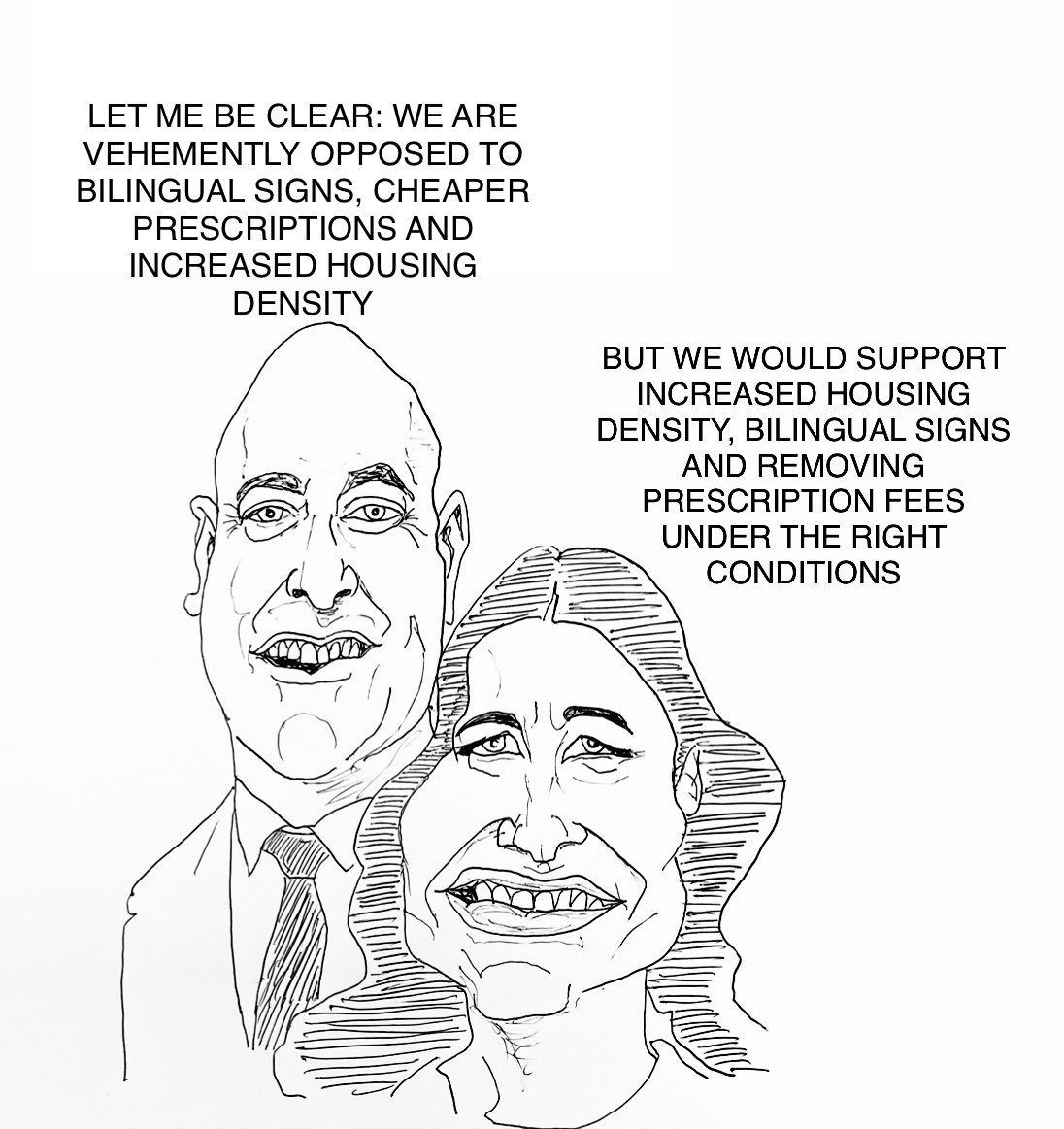ℂ𝕙𝕣𝕚𝕤 ℍ𝕚𝕡𝕜𝕚𝕟𝕤 𝕒𝕔𝕔𝕦𝕤𝕖𝕤 ℕ𝕒𝕥𝕚𝕠𝕟𝕒𝕝 𝕠𝕗 𝕕𝕠𝕘-𝕨𝕙𝕚𝕤𝕥𝕝𝕚𝕟𝕘 𝕠𝕧𝕖𝕣 𝕓𝕚𝕝𝕚𝕟𝕘𝕦𝕒𝕝 𝕣𝕠𝕒𝕕𝕤𝕚𝕘𝕟𝕤 - 𝕆𝕡𝕡𝕠𝕤𝕚𝕥𝕚𝕠𝕟 𝕗𝕝𝕚𝕡 𝕗𝕝𝕠𝕡𝕤... 𝕒𝕘𝕒𝕚𝕟
ℂ𝕙𝕣𝕚𝕤 ℍ𝕚𝕡𝕜𝕚𝕟𝕤 𝕒𝕔𝕔𝕦𝕤𝕖𝕤 ℕ𝕒𝕥𝕚𝕠𝕟𝕒𝕝 𝕠𝕗 𝕕𝕠𝕘-𝕨𝕙𝕚𝕤𝕥𝕝𝕚𝕟𝕘 𝕠𝕧𝕖𝕣 𝕓𝕚𝕝𝕚𝕟𝕘𝕦𝕒𝕝 𝕣𝕠𝕒𝕕𝕤𝕚𝕘𝕟𝕤 - 𝕆𝕡𝕡𝕠𝕤𝕚𝕥𝕚𝕠𝕟 𝕗𝕝𝕚𝕡 𝕗𝕝𝕠𝕡𝕤... 𝕒𝕘𝕒𝕚𝕟
ℙ𝕣𝕚𝕞𝕖 𝕄𝕚𝕟𝕚𝕤𝕥𝕖𝕣 ℂ𝕙𝕣𝕚𝕤 ℍ𝕚𝕡𝕜𝕚𝕟𝕤 𝕚𝕤 𝕒𝕔𝕔𝕦𝕤𝕚𝕟𝕘 ℕ𝕒𝕥𝕚𝕠𝕟𝕒𝕝 𝕠𝕗 𝕕𝕠𝕘-𝕨𝕙𝕚𝕤𝕥𝕝𝕚𝕟𝕘 𝕚𝕟 𝕚𝕥𝕤 𝕔𝕣𝕚𝕥𝕚𝕔𝕚𝕤𝕞 𝕠𝕗 𝕓𝕚𝕝𝕚𝕟𝕘𝕦𝕒𝕝 𝕣𝕠𝕒𝕕 𝕤𝕚𝕘𝕟𝕤. 𝕆𝕡𝕡𝕠𝕤𝕚𝕥𝕚𝕠𝕟 𝕕𝕖𝕡𝕦𝕥𝕪 𝕒𝕟𝕟𝕠𝕦𝕟𝕔𝕖𝕤 𝕪𝕖𝕥 𝕒𝕟𝕠𝕥𝕙𝕖𝕣 𝕗𝕝𝕚𝕡 𝕗𝕝𝕠𝕡 𝕠𝕟 𝕓𝕚𝕝𝕚𝕟𝕘𝕦𝕒𝕝 𝕣𝕠𝕒𝕕 𝕤𝕚𝕘𝕟𝕤.
Waka Kotahi announced last Monday its bilingual traffic sign programme was going to public consultation. On Friday, National's transport spokesperson Simeon Brown said the party did not support having road signs in both te reo Māori and English, saying it would be confusing for drivers.
Speaking at a public meeting, Brown said the signs needed to be clear and while it was okay for place names - "we all speak English, and they should be in English" - "when it comes to important signs saying things like 'Expressway', they should be in English, as it's going to be confusing if you add more words".
Speaking after the weekly Cabinet meeting on Monday, Labour leader Hipkins said many other countries had bilingual road signs and he did not believe there were any public safety concerns in having both languages.
.

.
"Bilingual road signs are not new. They might be new in New Zealand but if you travel around the world so many countries have bilingual roadsigns that look much like the bilingual road signs that are being talked about now.
"I don't think it creates public safety concerns, it doesn't in other countries around the world who have bilingual signs and I don't think it needs to in New Zealand either."
Hipkins accuses National of dog-whistling over bilingual roadsigns https://t.co/6ZWN5dQJtF
— RNZ News (@rnz_news) May 29, 2023
Asked if the matter was becoming a political football, he suggested National was dog-whistling to racists.
"The current leader of the National Party tried to trademark 'kia ora', so I'm not entirely sure where they're going with that unless it's an outright dog whistle."

He said the bilingual road signs were only updated when replacing old and damaged ones, so there was no additional cost involved.
People might be seeing more of them partly because more were being replaced after being damaged by Cyclone Gabrielle, he said.
"These are as these signs come up for replacement, bilingual elements are being introduced to them."
He said he could not remember whether Labour had approved the decision or was simply told about the change.
"I certainly recall having seen it go through the system, and I have no issue with it."
Te Pāti Māori this weekend also criticised National over its stance, saying if Brown thought bilingual signs confusing he should go back to school.
.

.
𝕋𝕙𝕖 𝔽𝕝𝕚𝕡 𝔽𝕝𝕠𝕡: ℕ𝕒𝕥𝕚𝕠𝕟𝕒𝕝 𝕠𝕡𝕖𝕟 𝕥𝕠 𝕓𝕚𝕝𝕚𝕟𝕘𝕦𝕒𝕝 𝕣𝕠𝕒𝕕 𝕤𝕚𝕘𝕟𝕤 - 𝕎𝕚𝕝𝕝𝕚𝕤 𝕔𝕝𝕒𝕣𝕚𝕗𝕚𝕖𝕤
The deputy leader of the opposition, Nicola Willis, has hit back at accusations from Prime Minister Chris Hipkins that National was dog-whistling in its criticism of bilingual road signs.
On Friday, National's transport spokesperson Simeon Brown said the party did not support having road signs in both te reo Maori and English, saying it would be confusing for drivers.
Since then National has walked back on its opposition.
Nicola Willis clarified her party's stance on First Up this morning, saying National is open to concept of bilingual signage but has empathy with those New Zealanders who have anxiety about them.





Comments
Post a Comment